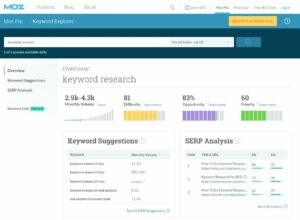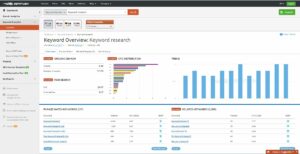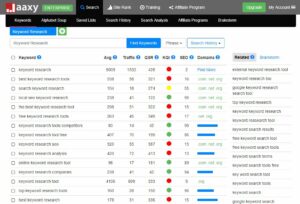Best and free keyword research tools will be discussed in this article. There are literally hundreds of tools available for keyword analysis, ranging from those geared toward newbies to those with particularly high levels of sophistication. They also go from being quite simplistic and useless to being extremely beneficial.
The best keyword research tools may streamline and simplify your workflow by helping you uncover the best keywords to target and providing you with the information you need to rank for them. However, they shouldn’t make you sell your first-born child and empty your bank account to get access to that information.
I’ve performed with a mixture of clients over the years who use a variety of tools for keyword research and SEO content optimization, so I’ve seen the best (and worst) of them, and I comprehend how critical it is to pick the finest keyword planner tool. I looked into more than 60 tools with a free keyword research option in order to assist. Here are the top six apps, including both universally acclaimed ones and others created for more niche use cases, based on extensive testing.
Top 6 Best free keyword research tools in 2022
Top 6 Best free keyword research tools are explained here.
- Semrush for seasoned SEO experts
- QuestionDB for locating keyword-based questions
- For affiliate marketers, Jaaxy
- Keyword Surfer, a free browser extension for SEO keyword research
What makes the best keyword research tool?
How we test and assess apps
All of our lists of the top applications are prepared by people with extensive experience using, evaluating, and writing about software. We invest many hours on app research and testing, using each app as it was intended to be used and comparing it to the standards we established for the category. We cherish the confidence readers place in us to provide honest evaluations of the categories and apps we evaluate, so we never accept payment for placement in our articles from any app or for referrals to any website. Read the entire explanation of how we choose the applications to feature on the Zapier blog for more information about our selection process.
The qualities of an excellent keyword research tool are really simple: you search for a specific keyword, and the tool informs you about it. However, there are so many various ways to use keyword data that I wanted to discover some tools that could handle a wide range of use cases as well as a few that were specifically made for some of the most common applications of keyword research.
I largely considered the following elements throughout testing to choose which apps made our initial list.
Data is presented. The top keyword research tools provide you with all the information required to rank for the keyword of your choice. At the very least, each of the apps we chose includes traffic, keyword difficulty, and competitive SERP research.
Sources of data. We felt it was crucial to take into account the sources of the data in each keyword research tool since you should be able to rely on the accuracy and objectivity of your keyword data. Every tool we listed imports data at the very least from Google Analytics or Google Search Console.
- Advice on keyword optimization. To use keyword research tools, you shouldn’t need to be a ten-year SEO veteran; the finest tools provide clear, basic recommendations on how to optimise for your keywords. There are tools (such as Ahrefs, Semrush, and Moz) that perform a comprehensive SEO study on your site, looking at anything from domain authority and topic clusters to site speed and technical information. We’re not searching for that here. We’re seeking for resources that may help any marketer or business owner quickly identify their target keyword and improve their website to rank for it.
- Free plan upgrades and allowances. Some tools label their “free plan” as having extremely limited outcomes. Or they restrict the free plan’s duration, thereby turning it into a trial. Only tools with evergreen free plans that are both generous enough to be truly helpful and affordable when it comes time to upgrade were included.
I put each tool that met those criteria to the test by putting it through a thorough methodology in order to identify the best of the best. Here is how my testing process looked:
- If required (many of these free applications don’t require account creation or offer any onboarding), I created an account and completed any supplied onboarding or guided training.
- To see the outcomes for various search intents, I searched for a variety of phrases, such as “free keyword research tools,” “chocolate cake,” and “best white shoes.”
- I looked at the available associated keywords, analytics, and other information. I also noted the information’s source, including whether it came from Google, non-search engine websites (such as social media or forums), or the tool’s original data.
- I checked the free plan’s allowances (such as time, results, metrics, searches per day or month, or other restrictions), as well as the price to upgrade to a paid plan if necessary.
- I evaluated more keyword research tools as they were available, including features for content improvement and competitive gap analysis.
The six best keyword research tools, each having a tolerable free version, are listed below after I spent more than 15 hours using these programmes.
1. Moz Keyword Explorer (Web)
The SEO platform from Moz includes a variety of keyword research tools. We see this as a positive even though Moz doesn’t offer as many data points as some of the other fully-featured SEO tools (such as SERP position history or the total amount of keywords a competitive result ranks for). Without sacrificing the metrics you truly care about, it makes for a less intimidating user experience for individuals who aren’t experienced search marketers. Also check seo benefits
You may look for any keyword using the Keyword Explorer tool & check its monthly book, difficulty, and organic clickthrough rate (CTR). From there, scroll down to obtain an examination of its current results rating & ideas for related keywords.
This is another keyword research tool. My favourite feature: Moz’s “Priority” score, which tells you whether a keyword is worthwhile for you to pursue, makes keyword research simple. In addition to your “My Score”—a measure you select yourself, marking how significant a certain keyword is to your company, based on your own expertise and knowledge of your business and industry—Moz automatically calculates the score based on the phrase’s volume, organic CTR, and difficulty.
Additionally, the Competitive Research tool’s new Keyword Gap function allows you to discover all the phrases that your rivals rank for but you do not.
Moz pricing: Up to 10 queries per tool, each month, with 1,000 keyword ideas and SERP analysis are free to use for keyword research features; Plans for Moz Pro start at $99 per month for 150 monthly keyword queries.
The top free tool for paid keyword research
2. Google Keyword Planner (Web)
Google Keyword Planner is one of the multiple useful tools available for PPC keyword research. You won’t ever have to worry about hitting restrictions or having to pay for upgrades because it’s totally free (even if you choose not to purchase Google Ads).
There are two main aspects in Google Keyword Planner: one is for exploratory keyword research and discovery, while the other is for more thorough analysis of search volume and predictions. This is another keyword research tool.
Like many of the tools on this list, the “Keyword ideas” feature searches for a seed phrase and then generates further keyword suggestions along with information on monthly search traffic, change over time, competition, ad image share, and bid ranges. Your keyword list can be filtered by brand or generic terms, source website, and more. The “Forecast” function, if you also use Google Ads, makes it simpler to budget and plan ahead for your paid advertisements.
By highlighting areas where ranking organically could help you save money on PPC, Keyword Planner can also aid you with your organic strategy.
The top free keyword research tool for expert SEO
3. Semrush (Web)
This is another keyword research tool. If you’re looking for something more sophisticated, Semrush offers a tonne of keyword data, makes it simple to delve into the specifics, and offers granular analysis of recent results in addition to SERP elements like featured snippets, reviews, site connections, and picture packs. Additionally, Semrush provides a wide field of keyword research tools, including content-driven keyword research, competitive keyword gap analysis, and the standard traffic and search volume metrics. Also check Sarwa alternatives
The breadth of those features is what really distinguishes Semrush, including the typical Keyword Overview, the Keyword Magic Tool for experimenting with keyword research, a Keyword Manager and position tracking, competitive Keyword Gap analysis, and Organic Traffic Insights, which—when integrated with your Google Analytics or Search Console account—can uncover those notoriously difficult “not provided” keywords.
The SEO Content Template tool is an added bonus because it enables you to automatically create a content brief and optimise content as you write by grading your content in real-time for readability, originality, tone of voice, and SEO. It does this by using a helpful bullseye graphic to help you strike the right balance. Additionally, the tool graphically verifies SEO tips as you go, such as adding pertinent links and images and using your goal and associated keywords.
Due to everything stated above, upgrading will be expensive; nevertheless, you can initially utilise it for free at low volumes.
Finding keywords with a question component is easiest with a free keyword research tool.
4. QuestionDB (Web)
One of the simplest tools I tested is QuestionDB. The tool’s name implies that when you join a keyword or broad topic, it will portray a list of questions that are similar that people have asked online.
The sourcing is what makes QuestionDB special. While many tools may display keywords based on questions that have been taken from Google or Bing, QuestionDB pulls questions from a wide range of websites, including Reddit, Quora, and Stack Exchange—which are, of course, gold mines of questions. This is another keyword research tool.
For instance, you might look for “keyword research” as a topic. You can observe how, why, & where people are talking about the subject by using QuestionDB to scour the web for frequent questions people are asking about keyword research. You can come up with content ideas, research a topic outside of the Google search box, and gather more information about the context in which you should discuss it. Also check SD Worx Payroll alternatives
For affiliate marketers, the top free keyword research tool
5. Jaaxy (Web)
Simple to use, Jaaxy’s keyword research instrument will provide you with a list of related & suggested keywords, along with some fundamental keyword statistics, once you join a keyword, topic, or URL (think average monthly search volume & traffic to page 1 results).
The fact that Jaaxy assists you in finding affiliate programmes to join and promote on your website is what caught my attention. To see a list of affiliate programmes from Commission Junction, Link Share, Digital River, and ClickBank, select the Affiliate Programs option and input your keyword. The listed commission & Alexa Rank for each programme and linked product website are also displayed by Jaaxy.
This is another keyword research tool. While Jaaxy’s free plan is among the most constrained I’ve encountered, paid plans provide a competitively priced entry point for anyone looking to monetize their website through affiliate marketing.
The top-rated free browser add-on for quick keyword research
6. Keyword Surfer (Chrome)
An easy approach to conduct keyword research without ever leaving the search engine results page is through browser extensions. Separate from the whole SEO packet, Surfer SEO’s Keyword Surfer add-on for Google Chrome provides a free, determinate version of the forum. This is another keyword research tool.
Once you’ve downloaded & enabled the extension, go to Google and perform a regular search for your keyword. As you enter, you’ll see expected search volume and CPC data appear in the search box. Entering will display the same information together with the quantity of exact match keywords used on the page for each SERP listing.
On the right side are representations of the SERP data and related keywords. You can click the Free AI Article Outline Generator link on the right to create an article outline. You’ll see a checklist of all the keywords your content has to contain along with a recommended heading hierarchy. Even better, you can simply share a link to the outline.
If you choose the complete Surfer SEO software, you’ll get access to the full Content Editor with an overall “Content Score,” recommendations for the number of headings, paragraphs, and photos to use, and free plugins for WordPress and Google Docs.






